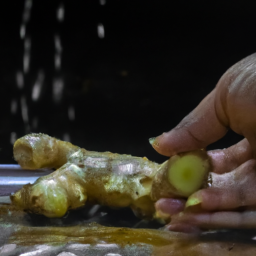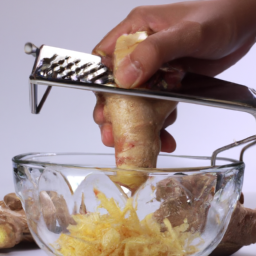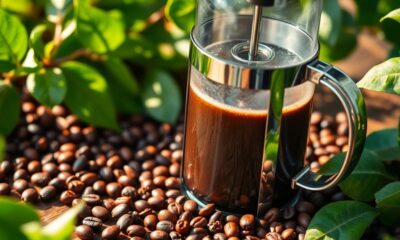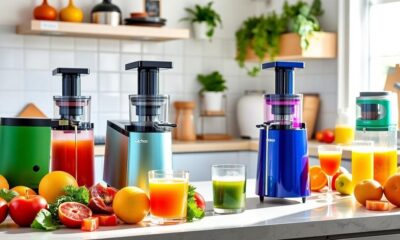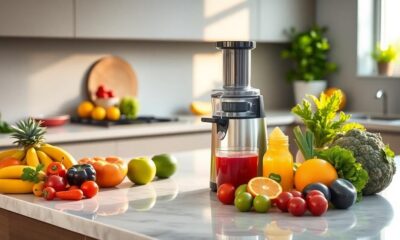Juice Tips and Tricks
How To Juice A Ginger Root
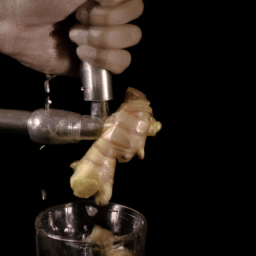
As a nutritionist, I always look for natural ways to boost my health while also enhancing the taste of my drinks and meals. Ginger root is one of my favorite ingredients because of its numerous health benefits and unique flavor. Juicing ginger root is a great way to incorporate its advantages into your diet, and it’s easier than you might think.
Ginger root contains a compound called gingerol, which has anti-inflammatory and antioxidant properties. It has been shown to alleviate nausea, reduce muscle pain and soreness, lower blood sugar levels, and even improve brain function. Juicing ginger allows you to concentrate its nutrients and flavor, making it a potent addition to your wellness routine.
In this article, I will guide you through the process of juicing ginger root, from selecting the right piece of ginger to storing the juice for later use. First, it’s important to choose fresh, firm ginger root with smooth skin, as this will yield the most juice. Once you’ve selected your ginger, I’ll show you exactly how to juice ginger using either a juicer, blender, or manual method, depending on what you have available. Finally, I’ll share tips on how to store your freshly made ginger juice, ensuring it stays fresh and potent for future use. Whether you’re using a juicer, blender, or manually grating and squeezing the ginger, knowing **how to extract ginger juice** efficiently will save time and effort. You can also strain the juice through a fine mesh sieve or cheesecloth to remove any pulp for a more refined texture. With proper storage, such as in an airtight container in the fridge, your ginger juice can last up to a week while maintaining its flavor and nutritional benefits.
Key Takeaways
- Ginger root contains gingerol, which has anti-inflammatory and antioxidant properties, and offers various health benefits such as reducing muscle pain, lowering blood sugar levels, and aiding in digestion.
- Juicing ginger root is an easy way to incorporate its goodness into your diet, and can be done by blending with water and straining through cheesecloth or using a juicer. Ginger shots are also popular for health benefits.
- Organic ginger is recommended for better health benefits, as it is grown without synthetic pesticides and fertilizers and contains higher levels of bioactive compounds responsible for medicinal properties. Growing ginger is easy and requires minimal maintenance.
- Ginger juice can be stored in an airtight container in the refrigerator for up to 5 days or frozen in ice cube trays for up to 6 months, and can be a great addition to drinks, cooking, and salad dressings. Discard ginger juice immediately if signs of spoilage are noticed.
Benefits of Juicing Ginger
Juicing ginger not only adds a zesty kick to your morning juice, but it also boasts a plethora of health benefits. Ginger contains a compound called gingerol, which has anti-inflammatory and antioxidant properties. This makes it a powerful aid in fighting off diseases and boosting the immune system. Drinking a ginger shot or ginger tea can help ease nausea, reduce muscle pain and soreness, and even lower blood sugar levels.
Aside from its immune-boosting properties, ginger also aids in digestion by stimulating the production of digestive juices and enzymes. It can also help alleviate indigestion, bloating, and other gastrointestinal discomforts. Incorporating ginger into your daily diet can lead to improved overall health and well-being.
Now that we know about the benefits of juicing ginger, let’s dive into how to choose the right ginger root for juicing.
Choosing the Right Ginger Root
When selecting the perfect ingredient for your homemade wellness elixir, it’s important to examine the ginger rhizomes for signs of quality. Choose a ginger root that is smooth and firm to the touch, with a fresh, spicy aroma. The skin should be thin and papery, without any signs of mold or soft spots.
Freshness and ripeness are also important factors to consider when choosing ginger. Look for rhizomes that have recently been harvested, as older roots may have lost some of their potency. The ginger should also be ripe, with a bright yellow interior and a juicy texture.
When selecting ginger, it’s important to choose a root that is both fresh and ripe to ensure maximum flavor and health benefits.
Now that you have chosen the perfect ginger root, it’s time to move on to cleaning and preparing it for juicing.
Cleaning and Preparing the Ginger
To get your elixir started, you’ll want to clean and prepare the ginger. Proper washing is essential to remove any dirt or pesticide residue that may be present on the rhizome. You can use a vegetable brush to scrub the skin thoroughly under cold running water.
It’s also important to peel the ginger before juicing it. The skin can be tough and fibrous, and may affect the texture of your juice. Here are three tips for peeling ginger:
-
Use a spoon: One of the easiest ways to peel ginger is to use a spoon. Simply scrape the skin off with the edge of the spoon, using a gentle back-and-forth motion.
-
Use a vegetable peeler: If you prefer a more traditional approach, you can use a vegetable peeler to remove the skin. Hold the ginger firmly and gently run the peeler along the surface of the rhizome.
-
Use a knife: If you’re comfortable using a knife, you can peel the ginger with a sharp kitchen knife. Hold the ginger firmly and carefully slice off the skin in thin strips.
Once the ginger is cleaned and peeled, it’s time to move on to cutting it into smaller pieces for juicing.
Cutting the Ginger
After cleaning and peeling the ginger root, it’s essential to chop it into smaller pieces before juicing. Slicing techniques are crucial in preparing your ginger root for juicing. A sharp knife is essential in slicing the ginger root into small pieces. The size of the pieces should be small enough to fit into the juicer’s chute and not too large to cause clogging.
There are different ways to slice ginger root, depending on how you intend to use it. For juicing, the most common technique is to cut the ginger into thin slices. A mandoline can be used to achieve uniform slices. Alternatively, you can use a sharp knife to slice the ginger into thin pieces.
Once the ginger root is sliced into smaller pieces, it’s ready for juicing.
Preparing ginger for juicing requires equipment such as a sharp knife or a mandoline. Slicing the ginger into small pieces is crucial in ensuring that the juicer works efficiently and effectively.
In the next section, we’ll look at how to juice the ginger and the benefits of ginger juice.
Juicing the Ginger
Imagine you’re a mad scientist creating a potion, and the final step is feeding the machine with your perfectly sliced and diced ginger pieces to extract the elixir of life. This is the process of juicing ginger, and it can be done in various ways. One method is blending ginger with water and straining the mixture through a cheesecloth. This is a simple method that requires minimal equipment and produces a smooth, pulp-free juice. Another popular technique is using a juicer, which extracts the juice from the ginger root and separates it from the pulp.
Blending ginger is a quick and easy way to make ginger shots, which are concentrated doses of ginger juice. Ginger shots are popular for their health benefits, including reducing inflammation, relieving nausea, and boosting the immune system. The table below shows the nutritional information for one ounce of ginger juice, which is equivalent to one ginger shot. Once the ginger has been juiced, it can be stored in an airtight container in the refrigerator for up to five days. In the next section, I will discuss the best ways to store ginger juice to ensure its freshness and potency.
| Nutrient | Amount per 1 oz of Ginger Juice |
|---|---|
| Calories | 5 |
| Carbohydrates | 1g |
| Fiber | 0g |
| Protein | 0g |
| Fat | 0g |
| Vitamin C | 2% RDA |
| Iron | 1% RDA |
| Calcium | 0% RDA |
Blending and juicing ginger is a simple process that can be done in a few easy steps. The resulting juice can be used to make ginger shots or added to smoothies and other drinks for an extra kick of flavor and nutrition. Properly storing ginger juice is essential to maintaining its freshness and potency, so be sure to follow the guidelines in the next section.
Storing the Ginger Juice
Ensuring that your ginger elixir stays fresh and potent is crucial for maximizing its health benefits, and there are a few simple tips for storing it properly.
First, it’s important to note that ginger juice can spoil quickly, so it’s best to consume it within a few days of juicing. To prolong its shelf life, consider the following tips:
- Store the ginger juice in an airtight container, such as a mason jar or a glass bottle with a tight-fitting lid, to prevent air exposure and contamination.
- Keep the ginger juice refrigerated at all times to slow down bacterial growth and maintain freshness.
If you want to freeze ginger juice for later use, pour it into ice cube trays and freeze. Once frozen, you can transfer the ginger cubes into a resealable plastic bag and keep them in the freezer for up to six months.
If you notice any signs of spoilage, such as a foul odor or mold growth, discard the ginger juice immediately to avoid any health risks.
By following these simple tips, you can ensure that your ginger juice stays fresh and potent for longer, allowing you to enjoy its numerous health benefits.
Now that you know how to store ginger juice properly, let’s move on to the next step: adding ginger juice to your drinks.
Adding Ginger Juice to Your Drinks
Now that we’ve learned how to store ginger juice, let’s talk about how to use it. Ginger juice is a great addition to any drink, whether it’s a smoothie, tea, or cocktail. It adds a spicy kick and a plethora of health benefits for digestion.
One of my favorite ways to use ginger juice is to spice up cocktails. A little bit of ginger juice can add a unique flavor profile to any cocktail and can even replace traditional cocktail mixers like simple syrup. Additionally, ginger has been shown to aid in digestion, making it a great addition to any drink after a big meal.
So, next time you’re mixing up a drink, try adding some ginger juice for an added boost of flavor and health benefits.
As we’ve seen, adding ginger juice to your drinks can be a game-changer. But don’t stop there. Ginger juice can also be used in your recipes. Let’s explore how to incorporate ginger juice in your cooking for even more delicious and healthy meals.
Using Ginger Juice in Your Recipes
I love using ginger juice in my cooking to add a spicy kick to my dishes. One of my favorite ways to incorporate ginger juice is by adding it to my homemade salad dressings. It pairs well with citrus flavors and adds a unique depth of flavor to my salads.
Another way I use ginger juice is in my marinades for meat and fish. The enzymes in ginger help to tenderize the meat and add a delicious flavor to my dishes.
Add It to Your Salad Dressings for a Spicy Kick
To spice up your salads, you can simply mix ginger juice with olive oil and vinegar for a zesty dressing that only takes a minute to make. Ginger adds a spicy kick to your salads that will leave your taste buds tingling. It’s also a great way to add some flavor to a boring salad and make it more exciting.
Ginger is known for its anti-inflammatory properties, making it a great addition to any healthy diet. Studies have shown that ginger can help reduce muscle pain and soreness, making it a great ingredient to add to your post-workout salad. One of my favorite ways to use ginger in a salad dressing is to make a ginger vinaigrette.
Simply mix ginger juice, olive oil, vinegar, and a pinch of salt and pepper. This dressing is perfect for a spicy salad with arugula, mixed greens, and cherry tomatoes. Use it in your marinades for meat and fish to add a zesty flavor that will make your taste buds dance.
So, add it to your salad dressings for a spicy kick!
Use It in Your Marinades for Meat and Fish
Looking to add some zesty flavor to your meat or fish? Try using ginger juice in your marinades for an extra kick that will leave your taste buds dancing. Ginger has anti-inflammatory properties that make it a great addition to any dish. Incorporating ginger juice in your marinades not only adds flavor but also tenderizes the meat, making it easier to digest.
To make a ginger marinade, start by juicing a ginger root and mixing it with your favorite herbs and spices. Use the table below for guidance on how much ginger juice to use for different types of meat and fish. You can also incorporate ginger juice into stir fries for added flavor and health benefits. Get creative with your cooking and explore the many ways you can use ginger juice to enhance your dishes.
| Type of Meat/Fish | Amount of Ginger Juice |
|---|---|
| Chicken | 1-2 tablespoons |
| Beef | 2-3 tablespoons |
| Fish | 1-2 tablespoons |
| Shrimp | 1-2 tablespoons |
Now that you know how to incorporate ginger juice into your marinades, let’s move on to some tips on how to juice a ginger root.
Tips for Juicing Ginger
When it comes to juicing ginger, I always make sure to use organic ginger for better health benefits. This ensures that I’m not consuming any harmful pesticides or chemicals.
Additionally, I like to experiment with different ginger varieties to add a unique flavor to my juices and recipes. It’s amazing to see how different types of ginger can affect the taste and aroma of a juice.
Use Organic Ginger for Better Health Benefits
Using organic ginger is like choosing a high-quality paintbrush – it may cost more, but the end result is worth it. When it comes to ginger juice, using organic ginger can provide more health benefits compared to conventional ginger. Here are three reasons why:
-
Organic ginger is grown without the use of synthetic pesticides and fertilizers, which means that you’re not consuming harmful chemicals along with the ginger juice. This is especially important since ginger is known to have powerful anti-inflammatory and antioxidant properties that can help boost your immune system and fight off diseases.
-
Organic ginger contains higher levels of bioactive compounds such as gingerols, shogaols, and zingerones, which are responsible for its medicinal properties. These compounds are more abundant in organic ginger since it’s allowed to grow at a slower pace without the use of growth hormones and other chemical agents.
-
By choosing organic ginger, you’re supporting sustainable farming practices that are better for the environment. Organic farming reduces pollution, conserves water, and promotes biodiversity, which means that you’re not only benefiting your health but also the planet.
If you want to maximize the health benefits of ginger juice, using organic ginger is the way to go. However, keep in mind that ginger comes in different varieties, and each one has its unique flavor and aroma.
In the next section, we’ll explore how to experiment with different ginger varieties to find the one that suits your taste buds.
Experiment with Different Ginger Varieties
To truly discover the best ginger variety for your taste buds, you should try experimenting with different types. Comparing ginger flavors is not only fun, but it can also help you find the ginger root that suits your juicing needs.
Some of the most common ginger varieties include Hawaiian, Jamaican, and Chinese ginger. Each variety has its own unique flavor profile and aroma, making the juicing experience more exciting.
If you want to take your experimentation to the next level, consider growing ginger at home. This way, you can have access to fresh ginger roots all year round. Growing ginger at home is easy and requires minimal maintenance.
You can purchase ginger rhizomes from your local nursery or online, and follow simple instructions to plant and care for them. By growing your own ginger, you can also ensure that it’s organic and free of harmful pesticides.
So go ahead and try different ginger varieties, and maybe even grow your own!
Frequently Asked Questions
Can I juice ginger in a blender or food processor instead of a juicer?
Yes, there are juicing alternatives to using a juicer for ginger juice recipes. Blenders and food processors can be used to extract ginger juice by blending ginger with water and straining the mixture. However, a juicer will provide a more concentrated juice with less pulp. Additionally, you can juice ginger without a blender by grating the ginger and then squeezing the liquid through a cheesecloth or fine-mesh strainer. This method may require a bit more effort, but it yields a fresh, homemade ginger juice with minimal equipment. It’s a great option for those who prefer not to invest in a juicer or blender.
How much ginger should I use in my juice for maximum health benefits?
For maximum health benefits, the recommended ginger juice dosage is 1-2 tablespoons per day. Ginger juice recipes can be mixed with other fruits and vegetables to enhance taste and nutritional value. Research has shown that ginger may have anti-inflammatory and digestive benefits.
Can I freeze ginger juice for later use?
Yes, ginger juice can be frozen for later use. It may lose some of its potency in the freezing process, but it is still a convenient option for alternative ginger recipes.
How long will ginger juice stay fresh in the refrigerator?
It’s funny how we always make ginger juice but never finish it. Ginger juice storage is tricky; it can last up to a week in the fridge, but it’s best to use it within three days. Its shelf life decreases once it’s exposed to air.
Is it safe to drink ginger juice every day?
Drinking ginger juice every day can provide various benefits, including reducing inflammation and aiding digestion. However, excessive consumption may lead to stomach upset. Experiment with ginger juice recipes to find a daily intake that works for you.
Conclusion
In conclusion, juicing ginger root is a simple and effective way to reap the numerous benefits of this powerful spice. Ginger has been used for centuries for its medicinal properties, from reducing inflammation to aiding digestion. By choosing the right ginger root, cleaning and preparing it properly, and juicing it correctly, you can easily incorporate ginger juice into your drinks and recipes.
However, it’s important to remember that while ginger juice can be a helpful addition to your diet, it shouldn’t be seen as a cure-all for any health issues you may have. As with any supplement or dietary change, it’s important to consult with your healthcare provider before making any drastic changes.
By combining the benefits of ginger juice with a balanced diet and regular exercise, you can work towards achieving a healthier and happier lifestyle.
Cindy thoroughly researches juicing trends, techniques, and recipes to provide readers with practical advice and inspiration. Her writing style is accessible, engaging, and designed to make complex concepts easy to understand. Cindy’s dedication to promoting the advantages of juicing shines through her work, empowering readers to make positive changes in their lives through the simple act of juicing.
Juice Tips and Tricks
How Long Is Fresh Lime Juice Good For

As a fan of cooking, I enjoy using fresh lime juice to give my dishes a delicious kick! It’s crucial to understand the expiration date of fresh lime juice to avoid ruining a dish or causing food poisoning.
In this article, I will explore the shelf life of fresh lime juice, the signs that it has gone bad, and tips for storing it properly to ensure maximum freshness and flavor. Fresh lime juice is a versatile ingredient that can be used in various dishes, from marinades and dressings to cocktails and desserts. However, its shelf life can vary depending on several factors, such as how it is stored and whether it is pasteurized or not.
By understanding how long fresh lime juice can last and how to properly store it, you can make the most of this delicious ingredient and elevate your culinary creations. So, let’s dive into the world of lime juice and explore its shelf life and storage options.
Key Takeaways
- Fresh lime juice should be used within a few days of juicing and signs of spoilage include sour smell, discoloration, and cloudiness.
- Proper storage is crucial for preserving flavor and freshness, with glass containers preferred and refrigeration necessary (avoid freezing).
- Bottled juice often contains additives and preservatives, while fresh juice has higher Vitamin C concentration and is important for best flavor.
- Using fresh lime juice is versatile and adds a zesty kick to cocktails, marinades, salsas, guacamole, and grilled dishes. Lemon juice and various types of vinegar can also be used as substitutes.
The Shelf Life of Fresh Lime Juice
The shelf life of fresh lime juice is a topic of concern for many home bartenders and mixologists alike, as it can quickly deteriorate after just a few days. The best way to ensure that your lime juice stays fresh for as long as possible is to store it properly.
Once you’ve cut open a lime and juiced it, it’s important to immediately transfer the juice to an airtight container and store it in the refrigerator. This will help to slow down the oxidation process and preserve the flavor of the juice.
If you’re using fresh lime juice in your cocktails, it’s important to note that using expired lime juice can have an impact on the taste of your drinks. Expired lime juice can become bitter and sour, which can negatively affect the overall flavor of your cocktails.
To avoid this, it’s best to use fresh lime juice whenever possible and to discard any juice that has gone bad. With proper storage and handling, you can enjoy fresh lime juice for up to a week. But how do you know when your lime juice has gone bad? Let’s take a look at some of the signs to watch out for.
Signs that Your Lime Juice Has Gone Bad
When your lime liquid has turned sour and smells funky, it’s time to toss it. But before you throw it out, there are ways to salvage bad lime juice. One method is to add a pinch of salt or sugar to the juice to balance out the acidity. Another is to dilute it with water or another liquid to reduce the tartness. However, if the juice has already reached a point where it is too acidic, it’s best to just get rid of it.
So how do you tell if lime juice is too acidic? One way is to taste it. If it makes your mouth pucker and feel uncomfortable, it’s probably too acidic. Another way is to look for discoloration or cloudiness in the juice, which could indicate that it has spoiled.
In general, it’s best to use fresh lime juice within a few days of juicing to ensure it’s at its peak freshness and acidity. Using fresh lime juice is important for achieving the best flavor in your recipes.
In the next section, we’ll discuss the benefits of using fresh lime juice and how it can elevate your dishes.
The Importance of Using Fresh Lime Juice
By using freshly squeezed lime juice, you can enhance the flavor profile of your dishes and bring out the natural acidity that complements a variety of flavors. The benefits of using fresh lime juice are numerous, including a brighter taste that adds a zing to your dishes. Additionally, fresh lime juice contains more nutrients and beneficial compounds, such as vitamin C and antioxidants, compared to bottled options. While bottled lime juice may be convenient, it often lacks the vibrant flavor and nutritional value of its fresh counterpart, and the shelf life of lime juice in bottled form is generally much longer due to preservatives. However, if you prioritize freshness and flavor over extended storage, freshly squeezed lime juice is always the better choice.
Additionally, freshly squeezed lime juice has a higher concentration of Vitamin C, which is essential for maintaining a healthy immune system. On the other hand, using bottled lime juice can have its drawbacks. Bottled lime juice often contains additives and preservatives that can affect the taste and quality of your dishes.
Moreover, bottled lime juice may not have the same level of acidity as fresh lime juice, which can impact the overall flavor of your dish. In short, using fresh lime juice is a must if you want to take your cooking to the next level and ensure that your dishes taste their best.
When it comes to storing lime juice, there are several tips that can help you keep your juice fresh for as long as possible.
Tips for Storing Lime Juice
When it comes to storing lime juice, there are a few key factors to keep in mind to ensure its freshness and quality. First, choose the right container – opt for a glass container with an airtight lid to prevent oxidation.
Keeping the juice at the right temperature is also crucial – refrigerate it at 40°F or below to prolong its shelf life.
Finally, avoid contamination by using clean utensils and surfaces. This can prevent bacterial growth and ensure the juice stays safe to consume.
Choosing the Right Container
To keep your lime juice fresh and flavorful, it’s essential to choose the right container. You should opt for a tightly sealed glass bottle or jar with a lime symbol etched on it. This will not only prevent spillage but also ensure that your lime juice stays fresh for a longer time.
Glass containers are preferred over plastic ones as they don’t react with the lime juice and keep it fresh for a longer time. Avoiding spillage is crucial while choosing the container for your lime juice. A tight seal will prevent air from entering the container, which can cause the juice to spoil quickly.
Once you have the right container, you can move on to the next step of keeping it at the right temperature.
Keeping it at the Right Temperature
Now that we’ve discussed the importance of choosing the right container for storing fresh lime juice, let’s talk about the next crucial aspect of keeping it fresh: temperature control. Proper storage methods are key to ensuring that your lime juice stays fresh and safe to consume. By controlling the temperature, you can prevent the growth of harmful bacteria and extend the shelf life of your lime juice.
Here are some tips for temperature control and storage methods when it comes to fresh lime juice:
- Keep your lime juice refrigerated at all times.
- Store your lime juice in an airtight container to prevent air exposure, which can cause oxidation and spoilage.
- Avoid freezing your lime juice, as this can alter the taste and texture.
- Use your lime juice within one week of opening for optimal freshness.
By following these simple temperature control and storage methods, you can keep your fresh lime juice safe and delicious for longer.
Now, let’s move on to the next step in ensuring the safety of your lime juice: avoiding contamination.
Avoiding Contamination
Ensuring the safety of your lime juice is crucial, so it’s important to take steps to avoid contamination. One way to prevent oxidation and keep your lime juice fresh is by using preservatives. Commonly used preservatives include citric acid, ascorbic acid, and sodium benzoate. These preservatives inhibit the growth of bacteria, mold, and yeast, which can cause spoilage and affect the taste and quality of your lime juice.
Another way to avoid contamination is by properly cleaning and sanitizing all equipment and surfaces used in the preparation, storage, and serving of your lime juice. This includes cutting boards, knives, juicers, containers, and utensils. Use hot, soapy water to clean these items and then sanitize them with a solution of one tablespoon of bleach per gallon of water. Be sure to also wash your hands thoroughly with soap and water before handling any ingredients or equipment. By taking these precautions, you can ensure that your lime juice stays fresh and safe to consume.
To learn how to extract lime juice properly, refer to the next section.
How to Extract Lime Juice
Hey there, looking to extract some fresh lime juice? Squeeze those green beauties until they’re bursting with tangy goodness, and you’ll have a zesty addition to any dish or drink. Here are four steps to help you extract the most juice from your limes:
-
Start by rolling the lime on a hard surface. This will break down the fibers inside and make it easier to extract the juice.
-
Cut the lime in half crosswise, not lengthwise. This will allow you to easily squeeze the juice out of each half.
-
Use a citrus juicer or a fork to extract the juice from each half. If you’re using a fork, simply press it into the flesh of the lime and twist it back and forth to release the juice.
-
Strain the juice through a fine mesh sieve to remove any pulp or seeds.
Now that you know how to extract lime juice, let’s talk about the benefits of lime juice and different ways to use it.
Lime juice is packed with vitamin C and antioxidants, making it a great addition to your diet. It can also be used in a variety of ways, such as:
- Adding it to marinades for a tangy flavor
- Mixing it with honey and ginger for a refreshing drink
- Squeezing it over grilled meats or seafood for a citrusy kick
- Using it in desserts, like key lime pie or lime sorbet
With so many ways to use lime juice, it’s a versatile ingredient that can add flavor to any dish.
In the next section, we’ll explore some delicious recipes that use lime juice to get your taste buds tingling.
Recipes that Use Lime Juice
Get ready to tantalize your taste buds with these amazing recipes that use zesty lime juice! Lime juice is a versatile ingredient that can add a burst of flavor to any dish.
One popular way to use lime juice is in cocktails. A classic example is the Margarita, which combines lime juice, tequila, and triple sec for a refreshing and tangy drink. Another popular cocktail is the mojito, which features lime juice, mint, and rum for a sweet and minty flavor. Lime juice can also be used in non-alcoholic drinks like limeade or as a garnish for a Bloody Mary.
Aside from cocktails, lime juice is also great for marinades. The acidity in the lime juice helps to tenderize meat while adding a bright and tangy flavor. A simple marinade can be made by combining lime juice, olive oil, garlic, and salt. This can be used for chicken, fish, or shrimp. Lime juice can also be added to salsas or guacamole for an extra kick of flavor.
Overall, lime juice is a versatile ingredient that can be used in a variety of recipes to add a tangy and refreshing taste.
Looking for alternatives to lime juice? Try using lemon juice or vinegar for a similar acidic flavor. These alternatives can be used in the same way as lime juice in marinades or dressings. Another option is to use citrus fruits like grapefruit or orange for a different twist on the classic lime flavor. With so many options, you can experiment with different ingredients to find the perfect flavor for your dish.
Alternatives to Lime Juice
As someone who loves to cook, I know that sometimes it can be frustrating when you don’t have all the ingredients you need.
When it comes to lime juice, there are some great alternatives that can be used in a pinch. Lemon juice is a great substitute that can give a similar flavor profile, while vinegar can add a tangy note. Additionally, other citrus fruits such as oranges or grapefruits can also work well in certain recipes.
So, next time you’re out of lime juice, don’t fret! You have plenty of other options to choose from.
Lemon Juice
If you’re trying to figure out how long your lemon juice will stay good for, it’s important to store it properly and keep an eye on the expiration date. Lemon juice is similar to lime juice in that it has a sour taste and provides health benefits such as being high in vitamin C and antioxidants.
Here are a few tips to keep your lemon juice fresh:
- Store in a sealed container in the refrigerator.
- Use within 2-3 days of opening.
- Check the expiration date on the bottle before using.
Now, if you’re looking for another alternative to lime juice, vinegar may be a good choice. It has a tangy taste that can be used in similar ways to lime juice, such as in salad dressings and marinades.
Vinegar
Moving on from lemon juice, let’s talk about vinegar. As a chef, I always have a bottle of vinegar within reach. Vinegar is a versatile ingredient that can be used in cooking, cleaning, and even as a beauty product. The benefits of vinegar are numerous, making it one of the most popular ingredients in the kitchen.
There are different types of vinegar, each with its unique flavor and acidity. The most common types of vinegar are white vinegar, apple cider vinegar, balsamic vinegar, and red wine vinegar. White vinegar is a pantry staple that can be used in pickling, marinades, and dressings. Apple cider vinegar is known for its health benefits and can be used in cooking and as a natural remedy. Balsamic vinegar is a sweet and savory vinegar that can be used in salads, roasted vegetables, and meats. Lastly, red wine vinegar has a bold flavor that pairs well with strong-flavored dishes.
Now, let’s move on to other citrus fruits and their shelf life.
Other Citrus Fruits
Let’s explore some other citrus fruits and how they can add a zesty punch to your meals. Citrus fruits are a great way to bring flavor and nutrition to your dishes. Here are three citrus fruit pairings that can take your cooking to the next level:
-
Lemon is an incredibly versatile citrus fruit that can add brightness to savory dishes, desserts, and drinks. It’s also packed with vitamin C and antioxidants that can boost your immune system and protect against chronic diseases.
-
Orange is another citrus fruit that can add a burst of sweetness and acidity to your meals. It pairs well with spicy ingredients and can be used in salads, marinades, and desserts. It’s also rich in vitamin C, folate, and potassium, which can support heart health and reduce inflammation.
-
Grapefruit is a tangy and bitter citrus fruit that can add a refreshing taste to your meals. It’s a great source of vitamin C, fiber, and antioxidants, which can improve digestion, lower cholesterol, and prevent cancer.
Incorporating these citrus fruit pairings into your meals can not only enhance the flavor, but also provide numerous health benefits.
Now, let’s move on to the next section about using frozen lime juice.
Using Frozen Lime Juice
Using frozen lime juice is a great way to enjoy the refreshing taste of lime throughout the year. Not only does it save the hassle of squeezing fresh lime juice, but it also has a longer shelf life. Frozen lime juice can be used in a variety of recipes, including cocktails, marinades, dressings, and soups.
Here are some benefits of using frozen lime juice:
| Benefit | Explanation |
|---|---|
| Convenience | Frozen lime juice can be easily stored and used whenever needed. |
| Cost-effective | Buying frozen lime juice in bulk can be more affordable than purchasing fresh limes. |
| Consistency | Frozen lime juice has a consistent flavor and acidity level, ensuring that every dish tastes the same. |
| Availability | Frozen lime juice is available year-round, making it easy to incorporate lime flavor into any recipe. |
Incorporating frozen lime juice into your diet can be a great way to add a burst of flavor and acidity to your meals. But, it’s important to note that while frozen lime juice has a longer shelf life, it still should be used within a reasonable time frame to ensure optimal flavor. Let’s explore some ways to incorporate lime juice into your diet.
How to Incorporate Lime Juice into Your Diet
Now that we know frozen lime juice can be a worthy substitute for fresh lime juice, let’s talk about the benefits of incorporating it into your diet.
Lime juice is a great source of vitamin C, which is important for maintaining healthy skin, hair, and immune system. It also contains antioxidants that can help fight inflammation in the body.
There are many different ways to use lime juice in cooking. You can use it as a marinade for meats, add it to salad dressings, or use it to flavor drinks and desserts. Lime juice can also be used in place of vinegar in recipes, giving dishes a tangy and refreshing flavor.
By adding lime juice to your meals, you can not only enhance the taste of your food but also reap the health benefits that come with it.
Frequently Asked Questions
Can you freeze fresh lime juice?
Looking to preserve lime juice? Wondering if you can freeze fresh lime juice? Absolutely! Freezing fresh lime juice is an easy way to extend its shelf life and keep it available for later use. Just be sure to use a freezer-safe container.
How long does bottled lime juice last compared to fresh lime juice?
I’ve compared bottled and fresh lime juice in terms of taste and nutrition. While bottled juice may be convenient, fresh juice has a brighter taste and higher vitamin C content. It’s best to use fresh juice within a few days for optimal flavor.
Can you use lime juice that has been left out at room temperature for a few hours?
I once left lime juice out and it turned brown and lost its flavor. To prevent this, use room temperature lime juice immediately or try preservation techniques such as refrigeration or freezing.
How do you know if a lime is ripe enough to extract juice from it?
To select a ripe lime for optimal juice extraction, look for one that is heavy for its size, has smooth skin, and yields slightly to pressure. Roll the lime on a hard surface before juicing to release more juice.
Are there any health benefits to consuming fresh lime juice regularly?
Drinking fresh lime juice regularly can provide numerous health benefits such as boosting immunity and aiding digestion. Adding it to recipes can also enhance flavor and nutrition. It’s a simple and tasty way to improve overall wellness.
Conclusion
In conclusion, fresh lime juice is a versatile ingredient that can add a burst of flavor to any dish or drink. Its tangy taste and high acidity make it a popular ingredient in many cuisines, including Mexican, Thai, and Indian.
However, using old or spoiled lime juice can ruin the taste of your dish and even pose health risks. To truly appreciate the benefits of fresh lime juice, it’s important to understand its shelf life and proper storage techniques.
By following the tips outlined in this article, you can ensure that your lime juice stays fresh and flavorful for longer. So whether you’re making a margarita, a ceviche, or simply adding a squeeze of lime to your water, remember to always use fresh lime juice for the best results.
Cindy thoroughly researches juicing trends, techniques, and recipes to provide readers with practical advice and inspiration. Her writing style is accessible, engaging, and designed to make complex concepts easy to understand. Cindy’s dedication to promoting the advantages of juicing shines through her work, empowering readers to make positive changes in their lives through the simple act of juicing.
Juice Tips and Tricks
How To Dilute Vape Juice

As a vaper, you may have come across vape juice that was too potent for your taste. The way to solve this issue is by diluting the vape juice. By adding a neutral base to your e-liquid, you can lower the nicotine content or diminish the flavor strength.
In this article, I’ll guide you through the step-by-step process of how to dilute vape juice.
Before we begin, it’s important to understand the significance of diluting vape juice. Vape juice is available in varying nicotine strengths, and while some vapers prefer stronger nicotine levels, others may find it too harsh. Similarly, some e-liquids may have a flavor that’s too overpowering for the user. Diluting vape juice can help you tailor your vaping experience to your preferences while making it smoother and more enjoyable.
Keep reading to learn how to dilute vape juice like a pro.
Key Takeaways
- Choosing the right diluent and measuring tools is crucial for proper dilution ratios.
- Measuring accuracy is key to achieving the perfect blend of flavors.
- Personal preference for nicotine levels affects the strength of vape juice.
- Proper mixing techniques are crucial for even distribution of nicotine throughout the vape juice.
Understanding the Importance of Diluting Vape Juice
You may be wondering why diluting your vape juice is so important, but let me tell you, it can make a world of difference in the overall vaping experience.
Diluting vape juice is essential for flavor enhancement, and it allows you to customize your juice to your liking. When you purchase vape juice, it’s typically made with a higher concentration of nicotine and flavorings than what’s ideal for most vapers.
Diluting your vape juice with a diluent such as propylene glycol (PG) or vegetable glycerin (VG) will not only reduce the nicotine and flavor concentration, but also help to create a smooth and enjoyable vaping experience.
The importance of diluting vape juice cannot be overstated. Not only can it enhance the flavor and customization of your juice, but it can also help to prevent harsh hits and throat irritation.
Diluting your vape juice is a simple process that anyone can do with the right supplies and a little bit of knowledge. Speaking of supplies, let’s move on to the next section about gathering the necessary supplies for diluting your vape juice. Before you begin, it’s important to make sure you have all the tools on hand, such as an empty bottle, diluted nicotine base, and flavor concentrates if desired. Understanding **how to empty vape juice** from your device is also key, as you’ll need to remove the current liquid before mixing in your new diluted solution. Make sure to clean your tank or pod thoroughly to avoid any residual flavors impacting the fresh mix.
Gathering the Necessary Supplies
Before beginning the process of diluting vape juice, it’s important to gather the necessary supplies.
Two key points to consider when gathering supplies are choosing the right type of diluent and measuring tools. When selecting a diluent, it’s important to choose one that is compatible with your vape juice and won’t alter the flavor or consistency.
Additionally, accurate measuring tools such as syringes or pipettes are crucial to ensure proper dilution ratios.
Choosing the Right Type of Diluent
When selecting the appropriate diluent, it’s crucial to consider the specific desired outcome of the vape juice. This means choosing the right type of diluent that will complement the chosen flavorings and nicotine strength. Choosing the wrong diluent could completely ruin the vape juice, resulting in a harsh and unpleasant taste.
One common mistake when choosing a diluent is using water. While this may seem like a simple and accessible option, water can dilute the flavorings too much and change the overall consistency of the vape juice. It’s important to choose appropriate flavorings that are compatible with the chosen diluent to ensure the best outcome.
It’s also recommended to avoid using common household items such as vegetable oil or alcohol, as they can be harmful if inhaled.
With the right diluent, the vape juice will have a smooth and satisfying taste that’s perfect for any vaping experience.
When it comes to measuring tools, precision is key.
Measuring Tools
Accuracy is crucial when measuring ingredients for your DIY e-liquid. It’s important to have the right measuring tools to ensure that your mix is consistent and safe to use.
There are a variety of measuring tools available, including syringes, graduated cylinders, and beakers. It’s recommended to use a dedicated set of measuring tools for your e-liquid mixing to avoid cross-contamination.
Measuring accuracy is key to achieving the perfect blend of flavors for your vape juice. Common mistakes include using the wrong measuring tool, using dirty or inaccurate measuring tools, and not measuring accurately.
It’s important to use the correct measuring tool for each ingredient, such as a smaller syringe for flavorings and a larger syringe for your base liquids. Always make sure to clean your measuring tools thoroughly between each use to avoid any contamination.
With the right tools and techniques, you can ensure that your DIY e-liquid is safe and consistent. Now, let’s move on to preparing your work area.
Preparing Your Work Area
Like a chef preparing to cook a gourmet meal, it’s important to set up your work area properly before diluting your vape juice. Here are some tips on how to prepare your workspace:
-
Clean your workspace thoroughly. This includes wiping down all surfaces with a disinfectant solution and ensuring that all tools and equipment are clean and dry. Cleaning precautions are crucial to avoid contaminating your vape juice and potentially harmful chemicals.
-
Organize your materials. Set up your measuring tools, mixing container, and vape juice in an orderly fashion. This will help you work more efficiently and avoid accidental spills or mistakes.
-
Use gloves and protective eyewear. Vape juice can be harmful if it comes into contact with your skin or eyes, so it’s important to wear gloves and protective eyewear while handling it.
-
Work in a well-ventilated area. Vape juice contains chemicals that can be harmful if inhaled, so it’s important to work in a well-ventilated area to avoid breathing in any harmful fumes.
Having your workspace properly set up will not only make the process of diluting your vape juice easier, but it will also ensure that you do it safely. Once your workspace is ready, the next step is to calculate the correct ratio for diluting your vape juice.
Calculating the Correct Ratio
When determining the strength of my vape juice, I like to consider two key points: the level of nicotine I want and the amount of flavor I prefer.
To calculate the correct ratio, I typically use a vape juice calculator, which helps me determine the right amount of each ingredient to use.
Choosing the desired strength can be a personal preference, but it’s important to keep in mind how much nicotine you’re consuming and whether it’s within a safe range.
Determining the Strength of Your Vape Juice
To figure out how strong your vape juice is, you’ll want to determine the nicotine concentration per milliliter. This can be done by checking the label on your e-liquid bottle or by using an online calculator.
Once you know the nicotine concentration, you can then calculate the strength of your vape juice by using the following formula:
- Multiply the nicotine concentration by the volume of the e-liquid (in milliliters).
- Divide the result by 1000 to get the total amount of nicotine in the e-liquid (in grams).
- Divide the total amount of nicotine by the total volume of the e-liquid (in milliliters) to get the nicotine concentration per milliliter.
- Finally, multiply the nicotine concentration per milliliter by the ratio of your vape juice (e.g. 70/30) to determine the strength of your e-liquid.
By determining the strength of your vape juice, you can then adjust the ratio of your e-liquid to suit your preferences.
This is important as it allows you to customize your vaping experience and ensure that you are vaping at a strength that is comfortable for you.
In the next section, we will discuss how to choose the desired strength for your vape juice.
Choosing the Desired Strength
Imagine you’re trying to find the perfect cup of coffee – you wouldn’t want it to be too weak or too strong. The same goes for choosing the desired strength of your e-liquid.
Several factors affect the strength of your vape juice, and it’s essential to determine the perfect nicotine level for your needs. One significant factor affecting the strength of your vape juice is personal preference for nicotine levels. Some vapers prefer a low nicotine level, while others prefer a higher concentration. It’s crucial to note that higher nicotine concentrations may result in a harsher throat hit.
Other factors that may affect the strength of your e-liquid include the type of device you’re using and the frequency of use. Keep these factors in mind when choosing the desired strength of your vape juice.
When you’ve determined the appropriate nicotine level for your e-liquid, it’s time to mix the vape juice.
Mixing the Vape Juice
Surprisingly, adding more nicotine to your vape juice can actually result in a smoother hit. However, it’s important to note that adding too much nicotine can result in an unpleasant taste or even nicotine sickness.
When mixing the vape juice, it’s important to use proper mixing techniques to ensure that the nicotine is evenly distributed throughout the juice. This can be done by shaking the bottle vigorously for several minutes or by using a magnetic stirrer.
In addition to nicotine, it’s also important to consider flavor combinations when mixing your vape juice. Different flavors can complement or contrast each other, resulting in a unique and enjoyable vaping experience. However, it’s important to start with small amounts of each flavor and gradually increase as necessary to avoid overpowering the other flavors.
Once the vape juice is mixed, it’s time to move on to testing the vape juice to ensure that it meets your desired strength and flavor.
Testing the Vape Juice
Now that we’ve mixed our vape juice, it’s time to test it out. Testing the vape juice is an essential step to ensure that the flavor and nicotine levels are to your liking.
There are various testing methods that you can use, but the most common way is to simply fill your tank and take a few puffs. Take note of the flavor and vapor production, as well as the throat hit.
If the flavor is too strong or weak, you can adjust the ratio of the e-liquid and diluent accordingly. If the throat hit is too harsh, you can add more diluent to smoothen it out. Always remember to test the vape juice before adding any additional ingredients.
Flavor preferences vary from person to person, and it may take a few tries to get the perfect mix. Don’t be discouraged if your first attempt isn’t what you expected. Experiment with different flavors and ratios until you find your favorite combination.
Also, keep in mind that steeping the vape juice can enhance the flavor, so be patient and let it sit for a few days before testing again. Once you’ve found the perfect mix, you can store the remaining vape juice for future use.
As we move on to the next step, remember that testing and adjusting your vape juice is a crucial part of the process.
Now that we’ve tested the vape juice, let’s move on to storing it properly.
Storing the Vape Juice
When it comes to storing vape juice, there are a few things to keep in mind. Firstly, choosing the right container is crucial. Glass bottles are the best option as they’re non-reactive and don’t leach chemicals into the juice.
Secondly, proper storage techniques are necessary to keep the juice fresh and flavorful. Keeping it in a cool, dark place away from direct sunlight and heat sources will help prevent oxidation and degradation.
Finally, always make sure to properly seal the container to prevent air exposure.
Choosing the Right Container
To get the perfect dilution for your vape juice, it’s important to choose the right container. Here are some factors to consider when selecting the best container:
-
Storage options – Look for a container that is airtight, leak-proof, and can be tightly sealed. You can use plastic or glass bottles, but make sure they’re food-grade and safe for use with e-liquids.
-
Material considerations – If you prefer a plastic container, make sure it’s made of high-density polyethylene (HDPE) or polypropylene (PP). These materials are resistant to chemicals and can withstand high temperatures, making them perfect for storing vape juice. Glass containers are also a good option as they don’t react with the liquid and are easy to clean.
-
Size – The size of the container will depend on how much vape juice you’re diluting. If you have a large amount, choose a bottle with a bigger capacity.
-
Labeling – It’s important to label your container with the type of vape juice and the dilution ratio so that you can easily identify it later on.
Choosing the right container is just the first step in properly diluting your vape juice. Next, you need to ensure that you store it correctly to maintain its quality and potency.
Proper Storage Techniques
Make sure you store your diluted mixture in a cool, dry place away from direct sunlight and heat sources to preserve its quality and flavor. Proper storage is crucial to maintaining the integrity of your vape juice, and can prevent contamination and degradation of the liquid. Avoid storing your mixture in areas with extreme temperature fluctuations, as this can cause changes in the chemical composition of the liquid.
Labeling your vape juice is also important when it comes to proper storage. This will help you keep track of the ingredients used, the date of creation, and the nicotine strength of the mixture. Proper labeling can prevent confusion and ensure that you’re using the correct mixture.
Additionally, it’s important to avoid contamination by using clean, sterile containers and equipment when preparing and storing your vape juice. This will prevent the introduction of bacteria or other harmful substances into the mixture.
As we move onto the next section about safety precautions, keep in mind that proper storage and labeling are key factors in ensuring a safe and enjoyable vaping experience.
Safety Precautions
For your own well-being, it’s best to take some safety measures when diluting your vape juice. Vaping has become a popular trend, but it’s important to remember that it involves a certain degree of risk. As you dilute your vape juice, you expose yourself to potential hazards, especially if you’re not familiar with the process.
To ensure your safety, make sure to wear protective equipment, such as gloves and goggles, when handling the ingredients. You should also keep a fire extinguisher nearby and avoid smoking or using open flames during the process.
Another safety precaution you should take when diluting your vape juice is to work in a well-ventilated area. Fumes from the ingredients can be toxic and may cause respiratory problems. Proper ventilation will help keep the fumes from accumulating and will prevent the risk of fire.
Additionally, you should always store your vape juice in a cool, dry place, away from children and pets. By following these safety measures, you can minimize the risk of accidents and ensure that your vaping experience is a safe and enjoyable one.
Now that you know about the safety precautions, let’s move on to troubleshooting common issues that you may encounter during the dilution process.
Troubleshooting Common Issues
I’ve experienced two common issues with vaping that can be frustrating: weak flavor and harsh throat hit.
Weak flavor may be caused by a number of factors, including a low-quality e-liquid or an old coil.
A harsh throat hit, on the other hand, can be caused by an e-liquid with too high of a nicotine level or a coil that needs to be replaced.
Weak Flavor
To enhance the flavor of your vape juice, you should try adding a few drops of concentrated flavoring to the bottle before diluting it. Here are some tips on how to get a stronger flavor:
- Experiment with different flavor concentrates to find the perfect combination for your taste buds.
- Adding sweetener can help bring out the natural flavors in the juice.
- Adjusting nicotine levels can also affect the taste of the juice, so try reducing or increasing the amount to see if it improves the flavor.
- Shake the bottle well before using it to ensure that the flavor is evenly distributed throughout the juice.
- Try steeping the juice by leaving it in a cool, dark place for a few days to allow the flavors to blend together.
If you’re still experiencing a weak flavor, it could be due to a harsh throat hit. In the next section, we’ll discuss how to address this issue.
Harsh Throat Hit
If you feel like your throat is on fire every time you take a hit, it’s time to address the issue of a harsh throat hit.
A harsh throat hit is a common problem among vapers, and it can be caused by various factors. One of the most common causes of a harsh throat hit is using a high nicotine concentration in your vape juice. Nicotine is a stimulant that can irritate your throat and cause a burning sensation. If you are using a high nicotine concentration, try switching to a lower concentration, and see if that helps reduce the harshness.
Another cause of a harsh throat hit is using an e-liquid that has a high PG (propylene glycol) content. PG is a common ingredient in vape juice, but it can also cause irritation to your throat. If you are experiencing a harsh throat hit, try switching to an e-liquid that has a higher VG (vegetable glycerin) content. VG is a thicker liquid that produces smoother hits and is less likely to cause irritation.
Additionally, make sure you’re drinking enough water to stay hydrated, as dehydration can also exacerbate the harshness of a throat hit. By following these tips, you can avoid a harsh throat hit and enjoy a smoother vaping experience.
Frequently Asked Questions
Can I dilute any type of vape juice?
Yes, any type of vape juice can be diluted. Diluting vape juice can offer benefits such as a smoother hit and longer lasting supply. Tips for achieving the perfect dilution ratio include using a high-quality diluent and measuring accurately.
What is the best way to store diluted vape juice?
Proper storage techniques play a crucial role in preserving the shelf life expectancy of diluted vape juice. It’s best to store it in a cool, dark place, away from direct sunlight and heat sources. Airtight containers are also recommended to prevent oxidation and contamination.
How long does diluted vape juice last?
I diluted my vape juice and found it lasted about 6 months. Diluting vape juice can increase its shelf life and is beneficial for beginners as it reduces the nicotine content and harshness of the vapor.
What are the best flavor combinations for diluted vape juice?
When diluting vape juice, I enjoy combining fruit and menthol for a refreshing taste, or dessert and tobacco for a rich flavor. Experimentation is key to finding your perfect combo.
Can I dilute vape juice with water?
Diluting vape juice with water may seem like a quick fix, but beware of potential drawbacks. While it can reduce the flavor intensity, it also dilutes the nicotine strength and may cause harsh hits.
Conclusion
In conclusion, diluting vape juice is a necessary process that requires attention to detail and precision. It’s important to gather the necessary supplies, prepare your work area, calculate the correct ratio, and mix the vape juice properly.
As you mix the vape juice, keep in mind the importance of testing and storing it correctly to ensure that it’s safe and enjoyable to use. Symbolically, diluting vape juice can be seen as a process of refinement. Like a diamond that must be cut and polished to bring out its full beauty, vape juice must be diluted just enough to bring out its full potential.
With patience and care, you can create a vape juice that’s not only safe to use but also provides a satisfying vaping experience. Remember to always take safety precautions and troubleshoot any issues that may arise. Diluting vape juice may seem daunting at first, but with practice, it can become a simple and rewarding process.
Cindy thoroughly researches juicing trends, techniques, and recipes to provide readers with practical advice and inspiration. Her writing style is accessible, engaging, and designed to make complex concepts easy to understand. Cindy’s dedication to promoting the advantages of juicing shines through her work, empowering readers to make positive changes in their lives through the simple act of juicing.
Juice Tips and Tricks
How Long Is Fresh Lemon Juice Good For

As someone who frequently incorporates fresh lemon juice into my meals and beverages, I am constantly curious about the shelf life of lemon juice when stored in the refrigerator. It is essential for me to verify that the lemon juice I utilize is not only fresh but also safe for consumption.
In this article, I will explore the factors that affect the shelf life of fresh lemon juice, how to determine its freshness, and how long it can last in the fridge.
It’s important to understand that the shelf life of fresh lemon juice can vary depending on a number of factors, including the storage temperature, the container it’s stored in, and whether or not it has been pasteurized. By understanding these factors and taking steps to extend the shelf life of lemon juice, we can ensure that it remains fresh and safe to use for as long as possible.
So, let’s dive in and explore how to make the most of this versatile citrus fruit.
Key Takeaways
- Freshly squeezed lemon juice lasts for 2-3 days in the fridge, while commercially bottled juice lasts for 6 months in the fridge after opening.
- Proper storage is essential to minimize air exposure, which can affect the freshness of the juice.
- Freezing fresh lemon juice in an airtight container can keep it fresh for up to 6 months.
- Spoiled lemon juice can lead to bacterial growth and food poisoning, and expired juice may be harmful and ineffective.
Factors Affecting the Shelf Life of Fresh Lemon Juice
Let’s talk about what affects how long your fresh lemon juice will last! The shelf life of fresh lemon juice can be influenced by many factors. One of the most significant factors is the preservation technique used.
If you want to extend the shelf life of your freshly squeezed lemon juice, you need to pay attention to how you store it. Commercial lemon juice storage usually involves pasteurizing the juice to kill bacteria and other microorganisms. However, pasteurization can affect the flavor and nutrient content of the juice.
To keep your fresh lemon juice fresh for longer, you can try some lemon juice preservation techniques. One method is to freeze the juice in an airtight container. This will keep the juice fresh for up to 6 months. Another option is to add a small amount of lemon juice to a glass jar and fill it with water. This will preserve the juice for up to a week.
By using these preservation techniques, you can ensure that your lemon juice stays fresh for as long as possible. Now, let’s move on to the next section where we’ll talk about determining the freshness of your lemon juice.
Determining Freshness of Lemon Juice
You can easily determine the quality of your lemon juice by observing its color and scent. Fresh lemon juice should have a vibrant, translucent yellow color and a strong, citrusy fragrance. If the juice has a murky or dull appearance and a faint or unpleasant smell, it may not be fresh anymore. To ensure that you are using fresh lemon juice, consider the following table that describes the different stages of lemon juice freshness.
| Freshness | Color | Scent |
|---|---|---|
| Fresh | Translucent yellow | Strong, citrusy |
| Starting to deteriorate | Slightly murky | Mild citrusy |
| Spoiled | Opaque, murky | Foul odor |
Apart from checking the freshness of your lemon juice, you may also want to know ways to preserve it and the benefits of drinking it daily. One way to extend the shelf life of lemon juice is to store it in an airtight container in the refrigerator. Adding a small amount of vitamin C powder or citric acid can also help prevent spoilage. Drinking lemon juice daily can provide numerous health benefits, including improving digestion, boosting immunity, and aiding in weight loss. It is important to ensure that you are using fresh lemon juice to maximize these benefits. In the next section, we will discuss the signs of spoiled lemon juice.
Signs of Spoiled Lemon Juice
If lemon juice is left to spoil, it can lead to bacterial growth and potential health risks, such as food poisoning, which affects 48 million Americans each year. Therefore, it’s important to detect the signs of spoiled lemon juice. Here are some ways to tell if your lemon juice has gone bad:
- Smell: Lemon juice that’s gone bad will have a rancid or sour smell.
- Appearance: Spoiled lemon juice may become cloudy or have a darker color.
- Taste: If your lemon juice tastes off or has a strange aftertaste, it may have gone bad.
If you’ve detected that your lemon juice has gone bad, don’t throw it away just yet. There are ways to repurpose spoiled lemon juice, such as using it as a natural cleaner or adding it to marinades or dressings for a tangy flavor. However, if the lemon juice is severely spoiled, it’s best to dispose of it properly.
Moving onto the next topic, how long does fresh lemon juice last in the fridge?
How Long Does Fresh Lemon Juice Last in the Fridge?
Storing lemon juice in the fridge can extend its shelf life, but it’s important to know how to properly store it to ensure it stays safe to consume.
Freshly squeezed lemon juice can last up to 2-3 days when stored properly in a sealed container in the fridge. However, commercially bottled lemon juice can last up to 6 months in the fridge after opening, as long as it is tightly sealed and stored in a cool place. The difference in shelf life is due to preservatives and pasteurization processes used in commercially bottled lemon juice, which help extend its longevity. It’s important to note that visual and smell tests should always be done before consuming to ensure freshness, regardless of how long lemon juice lasts. If it begins to smell off or change in color, it’s best to discard it.
Lemon juice is a versatile ingredient used in many recipes, from marinades and dressings to desserts and cocktails. If you run out of fresh lemon juice, there are many substitutes available, such as lime juice, white wine vinegar, or apple cider vinegar.
Knowing how long fresh lemon juice lasts in the fridge can help in planning meals and avoiding waste.
In the next section, I’ll discuss some tips for extending the shelf life of lemon juice.
Tips for Extending the Shelf Life of Lemon Juice
To keep your lemon juice fresh for longer, there are several ways to preserve it. The first step is to store it in an airtight container. Oxygen is one of the main enemies of fresh lemon juice, so sealing it tightly will help to minimize the amount of air that comes into contact with the juice.
Another way to preserve lemon juice is to keep it in the fridge. The cool temperature of the fridge will help to slow down the chemical reactions that cause the juice to spoil. However, it’s important to note that even when stored in the fridge, fresh lemon juice will only last for a few days.
Drinking lemon juice daily has several health benefits. Lemon juice is rich in vitamin C, which is essential for strengthening the immune system. It’s also a natural diuretic, which means that it can help to flush out toxins from the body and reduce bloating.
However, to reap the full benefits of lemon juice, it’s important to consume it when it’s fresh. Using expired lemon juice may not only be ineffective but could also be harmful to your health. Therefore, it’s essential to ensure that you store your lemon juice properly and use it within a few days of juicing.
Using Expired Lemon Juice
You shouldn’t risk using expired lemon juice, as it may have lost its potency and could potentially harm your health. While it may be tempting to use that half-empty bottle of lemon juice that’s been sitting in your fridge for months, it’s important to remember that the longer it sits, the less effective it becomes.
Here are some reasons why you should avoid using expired lemon juice:
-
It may not taste as good: Lemon juice that’s been sitting for a long time may develop a bitter taste, which can affect the flavor of your dishes.
-
It may not work as well in recipes: The acidity of lemon juice is what makes it an excellent ingredient for cooking and baking. However, expired lemon juice may have lost its acidity, which means it might not work as well in recipes that require a certain level of acidity.
-
It may not be as effective in DIY cleaning: Lemon juice is a popular natural cleaning agent, but expired lemon juice may not be as effective in removing stains and odors.
-
It may be unsafe to consume: Using expired lemon juice could potentially lead to food poisoning, as the bacteria in the juice may have grown to unsafe levels.
So, it’s best to avoid using expired lemon juice altogether and opt for fresh lemon juice instead. Not only will it taste better, but it’ll also work better in recipes and cleaning.
Speaking of health benefits, did you know that lemon juice has many health benefits? Let’s explore them in the next section.
Health Benefits of Lemon Juice
Get ready to feel refreshed and energized, because incorporating lemon juice into your daily routine can have numerous health benefits! Lemon juice is packed with vitamin C, which is essential for maintaining a healthy immune system and fighting off infections.
Additionally, lemon juice has been shown to improve digestion, reduce inflammation, and even aid in weight loss. There are many ways to incorporate lemon juice into your diet, from adding it to water or tea to using it in DIY lemon juice recipes for cooking or baking.
Lemon juice can also be used topically for skincare, as it has natural antibacterial properties that can help to reduce acne and improve overall skin health. So why not give it a try and see how lemon juice can benefit your health and wellness?
As we move into discussing alternative uses for lemon juice, it’s important to note that while lemon juice can be a great addition to your daily routine, it should be used in moderation. Excessive consumption of lemon juice can lead to tooth enamel erosion and other health concerns.
With that in mind, let’s explore some creative ways to use lemon juice beyond its health benefits.
Alternative Uses for Lemon Juice
If you’re worried about the sour taste, don’t fret – adding a splash of lemon juice to your favorite recipes can add a bright and tangy flavor that complements a variety of dishes. But did you know that lemon juice can also be used for cleaning applications? Here are a few alternative uses for lemon juice that you may not have considered:
- Remove stains: Lemon juice can be used to remove stubborn stains from clothing, carpets, and upholstery.
- Freshen up your home: Mix lemon juice with water and use it as a natural air freshener to eliminate odors in your home.
- Polish metal: Lemon juice can be used to clean and shine metals such as brass, copper, and stainless steel.
- Clear up acne: The citric acid in lemon juice has antibacterial properties that can help clear up acne.
- Tenderize meat: The acidity in lemon juice can help break down tough meat fibers, making it a great marinade for meats.
In addition to these cleaning applications, lemon juice can also be used in a variety of culinary ways. Add a splash to your salad dressings, marinades, or sauces for a bright burst of flavor. You can even use it to make homemade lemonade or add a tangy twist to your cocktails.
With so many versatile uses, it’s no wonder that lemon juice is a staple in many kitchens. Now, let’s move on to the environmentally friendly disposal of lemon juice.
Environmentally Friendly Disposal of Lemon Juice
Now that we’ve explored different ways to use lemon juice beyond its traditional culinary purposes, let’s talk about the importance of sustainable disposal.
As a virtual assistant, I’m passionate about eco-friendly options that reduce waste and minimize our impact on the environment. It’s crucial to properly dispose of lemon juice after using it to prevent harmful effects on our water and soil.
When it comes to sustainable disposal, the best option is to compost the lemon juice. By adding it to your compost pile, you can help enrich the soil with vital nutrients and reduce landfill waste. Lemon juice is acidic, which means it can help balance the pH levels of your compost, improving its overall quality.
If you don’t have a compost pile, you can also add lemon juice to your yard waste bin, as it will go through the same composting process as other organic materials.
Another eco-friendly option for disposing of lemon juice is to use it as a natural cleaning solution. You can mix it with water and use it to clean your kitchen, bathroom, and other areas of your home. This is a great way to avoid using chemical-based products that can harm the environment. By using lemon juice, you can disinfect surfaces and leave a fresh scent without negatively impacting the planet.
In conclusion, there are many sustainable ways to dispose of lemon juice, and I hope these tips have inspired you to make a positive impact on the environment.
Frequently Asked Questions
Can you freeze fresh lemon juice to extend its shelf life?
Yes, freezing fresh lemon juice can extend its shelf life while preserving the citrus flavor. The process should be done in an airtight container and can last for up to 6 months in the freezer.
How long can fresh lemon juice be stored in the freezer?
I have found that fresh lemon juice can be stored in the freezer for up to six months without losing its flavor or nutritional value. Freezing lemon juice is an excellent way to have it readily available for various lemon juice recipes.
Does the type of container affect the shelf life of fresh lemon juice?
As someone who frequently uses fresh lemon juice, I’ve found that the best storage method is to keep it in a tightly sealed glass container in the refrigerator. To tell if it’s gone bad, look for cloudiness or a sour smell.
Can you mix fresh lemon juice with other ingredients to extend its shelf life?
To extend the shelf life of fresh lemon juice, I use lemon juice preservation techniques such as adding citric acid or storing in the refrigerator. Lemon juice recipes with extended shelf life include lemon curd or preserved lemons.
Can fresh lemon juice be used as a natural cleaning solution?
I recently discovered the power of using fresh lemon juice as a natural cleaning solution. Its acidity removes stubborn stains and disinfects surfaces without harmful chemicals. Using natural cleaning solutions like lemon juice has numerous benefits for our health and the environment.
Conclusion
Well, who would’ve thought that something as simple as lemon juice could be so complicated? After researching and writing about the shelf life of fresh lemon juice, I can confidently say that there’s more to this citrus fruit than meets the eye.
Despite its health benefits and versatility in cooking and cleaning, lemon juice has a limited shelf life and can quickly spoil if not stored properly. It’s ironic that something that seems so fresh and invigorating can turn sour and unusable so quickly.
However, with the right storage techniques and attention to signs of spoilage, you can enjoy the benefits of fresh lemon juice for longer. So, go ahead and squeeze that lemon, but make sure to use it up before it’s too late!
Cindy thoroughly researches juicing trends, techniques, and recipes to provide readers with practical advice and inspiration. Her writing style is accessible, engaging, and designed to make complex concepts easy to understand. Cindy’s dedication to promoting the advantages of juicing shines through her work, empowering readers to make positive changes in their lives through the simple act of juicing.
-

 Popular Juice Brands4 weeks ago
Popular Juice Brands4 weeks ago10 Top-Rated Organic Juice Brands to Try
-

 Popular Juice Brands4 weeks ago
Popular Juice Brands4 weeks ago9 Best No-Sugar-Added Popular Juice Brands
-

 Health Benefits of Juice2 weeks ago
Health Benefits of Juice2 weeks agoHow Much Bottled Lemon Juice Equals 1 Lemon
-

 Vegetable Juices4 weeks ago
Vegetable Juices4 weeks ago12 Top Organic Vegetable Juice Brands Reviewed
-

 Juice Tips and Tricks1 week ago
Juice Tips and Tricks1 week agoHow Long Does Lemon Juice Last After Expiration Date
-
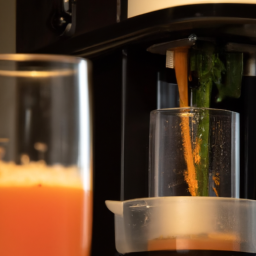
 Juice Tips and Tricks1 week ago
Juice Tips and Tricks1 week agoHow Long Does Juice Last After Juicing
-

 Juice Tips and Tricks1 week ago
Juice Tips and Tricks1 week ago2 Lemons Equal How Much Juice
-

 Vetted3 months ago
Vetted3 months ago15 Best Juices for Diabetics: Refreshing Options That Won’t Spike Your Blood Sugar



